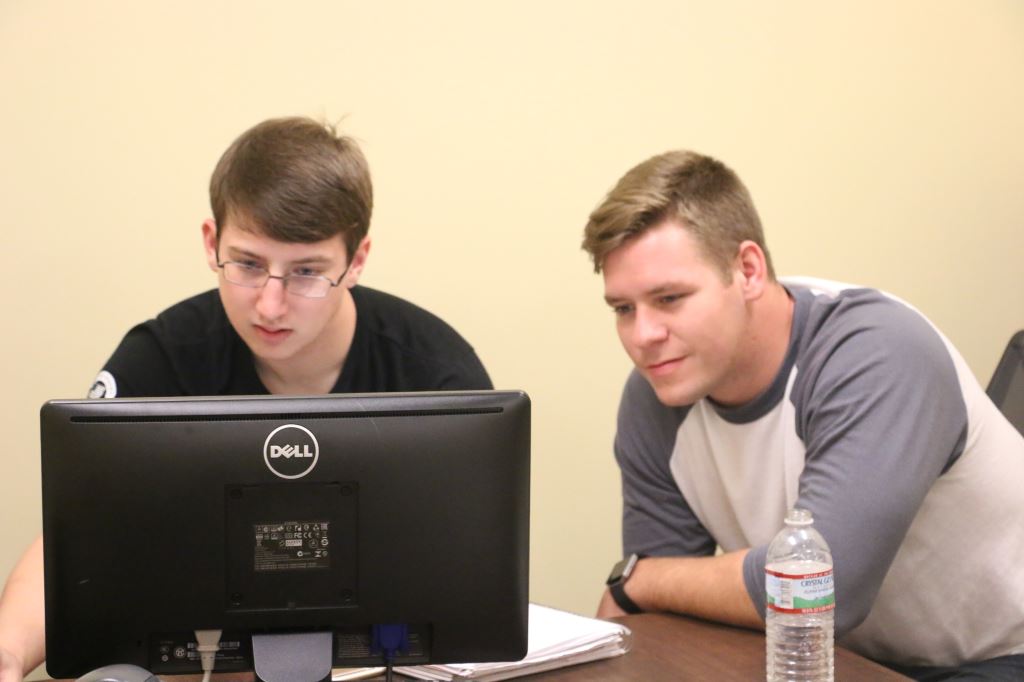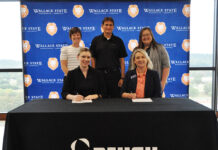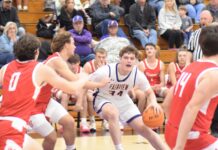David Hinds, left, graduated from Wallace State in May and is currently interning at HudsonAlpha in Huntsville.
HANCEVILLE – David Hinds was one of the first Wallace State students to show interest last fall in a newly formed genetics research club on campus.
It ultimately led to him earning a summer internship at the HudsonAlpha Institute for Biotechnology in Huntsville as part of the BioTrain 2017 program. Hinds began the internship last week and will continue to dig deeper into genetic research this summer, working with prestigious scientists and researchers.
According to the HudsonAlpha website, the BioTrain internship program allows students to gain skills and knowledge that prepare them for the workforce as well as related higher education coursework.
During a competitive application process, Hinds wrote an essay explaining why he was a strong candidate for the position, including explaining the research work he’s participated in at Wallace State with HudsonAlpha senior scientist Dr. Jeremy Prokop.
The BioTrain program accepts 25 to 30 interns each year.
Hinds is the first student to earn a research internship at HudsonAlpha upon graduating from Wallace State.
“I had my fingers crossed I could get in. I was cautious though because there were a lot of people applying from larger colleges, and there were only so many slots from across the country,” Hinds said. “I’m one of the lucky ones who has a chance to learn more this summer, and I’m grateful for Wallace State allowing me to get involved with research. Not many community colleges present the research opportunities I’ve had.”
Wallace State’s Biology Department began meeting with Prokop a couple of times a month last fall after the idea was spearheaded by WSCC graduate Casey Smith, who is finishing a biology degree at UAH. Smith facilitated Wallace State to be the fourth institute to join HudsonAlpha in this Bioinformatics Research Opportunities club.
Hinds was among the first Wallace State students to take advantage of the opportunity, which allows Prokop to spend time on campus and help the students use computer programs to analyze changes in genetic variants to predict how those changes alter protein structures and affect cellular biology and disease.
The inaugural research group at Wallace State also visited HudsonAlpha last November, and the club added more members during the spring semester.
Hinds, a 2015 West Limestone graduate, values the exclusive chance he has this summer to dig deeper into the research.
“I’m excited to learn about the advances they plan to make in the future about genomic medicine, including taking variants in your DNA and applying it to the real world and predicting and personalizing medicines in the future.” Hinds said. “It’s amazing I’m going to be able to work hand-in-hand with some of the top researchers on the planet.”
As Hinds dives into the internship, Prokop has been overwhelmed with the genomic research interest he has received during his visits to Wallace State.
“I’ve been impressed with the entire group, not just David. It’s been very encouraging how we’ve been able to push research in less than a year at a place we didn’t have research ongoing, and it’s great to see the students’ passion behind it. I think David highlights the entire group we have here and how much they have picked up learning about research. They are passionate about science and eager to get out from behind a computer and go into a lab and translate it into real life,” Prokop said.
Hinds has plans to transfer to UAH in the fall and eventually enroll in graduate school.
“I know I want to major in a science-related field. I’ve thought about kinesiology or physical therapy, but I also think this summer may help me out. Whether you are going to graduate school or looking to earn a doctorate, you need research experience in biology,” Hinds said. “I’m also thankful I’ve been able to meet Dr. Prokop. Without him, I don’t think I would have had much of a chance to be accepted. I probably would have been overlooked in the process.”
Wallace State’s Bioinformatics Research Opportunities club meets on Tuesdays during the fall and spring semesters. The group is open to Wallace State students of all majors and interests. For more information about the club, contact Connie Briehn at 256-352-8108 or at connie.briehn@wallacestate.edu.
“If students stick with this program and listen to people like Dr. Prokop and Casey Smith, you’ll have the opportunity to advance far in your field. It doesn’t have to be in genetics. They can help you in many areas,” Hinds said.
For more information about Wallace State, visit www.wallacestate.edu.
HudsonAlpha Institute for Biotechnology is a nonprofit institute dedicated to innovating in the field of genomic technology and sciences across a spectrum of biological challenges. Opened in 2008, its mission is four-fold: sparking scientific discoveries that can impact human health and well-being; bringing genomic medicine into clinical care; fostering life sciences entrepreneurship and business growth; and encouraging the creation of a genomics-literate workforce and society. The HudsonAlpha biotechnology campus consists of 152 acres nestled within Cummings Research Park, the nation’s second largest research park. Designed to be a hothouse of biotech economic development, HudsonAlpha’s state-of-the-art facilities co-locate nonprofit scientific researchers with entrepreneurs and educators. The relationships formed on the HudsonAlpha campus encourage collaborations that produce advances in medicine and agriculture. Under the leadership of Dr. Richard M. Myers, a key collaborator on the Human Genome Project, HudsonAlpha has become a national and international leader in genetics and genomics research and biotech education, and includes more than 30 diverse biotech companies on campus. To learn more about HudsonAlpha, visit: http://hudsonalpha.org/.



























